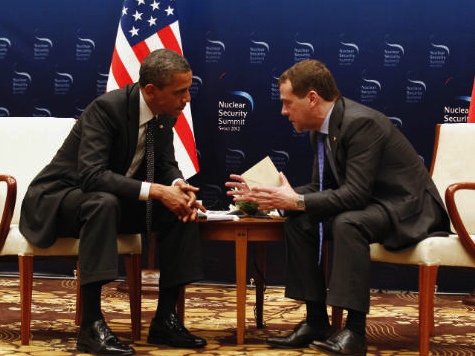There has been a chorus of criticism–and ridicule–surrounding President Barack Obama’s response to Russia’s impending annexation of Crimea. Having failed, after several long telephone conversations, to deter Russian President Vladimir Putin, President Obama is now responding with sanctions against seven–seven–individuals in the Russian government. Charles Krauthammer called Obama’s response “humiliating,” and it certainly is.
But say this for Obama: he is keeping his campaign promise. In 2008, Obama repeatedly promised something called “tough diplomacy” with America’s rivals. “I will initiate tough diplomacy with our enemies,” he promised in May 2008, adding that he would meet them “without preconditions although with preparation.”
Obama never bothered to define the term “tough diplomacy,” but it meant something less than “tough talk.” He slammed his Republican rival, Sen. John McCain of Arizona, for wanting “tough talk” with Iran: “And that’s the policy that John McCain is running on. He has nothing to offer except the naive and irresponsible belief that tough talk from Washington will somehow cause Iran to give up its nuclear program and support for terrorism.”
What was “tough diplomacy,” if not “tough talk”? In practical terms, it meant showing that the U.S.–or at least its enlightened leader–was prepared to break with precedent and show that he considered the interests and beliefs of America’s enemies to be legitimate. He was prepared to call Ayatollah Ali Khamenei the “Supreme Leader,” if it made compromise easier. In the latest crisis, Secretary of State John Kerry has recognized “Russia has deep historical, cultural, and other kinds of interests with respect to Ukraine and particularly Crimea.”
So “tough diplomacy” meant an inverted kind of political courage, on the part of the Obama administration, to yield to the worldview of whoever was challenging American interests and allies, in the hope they would then be inclined to reciprocate with real-world concessions. That is the “21st century” ethic to which Kerry has clung in recent weeks, as opposed to the “19th century” method of simply declaring what you want, and taking it.
The idea of “tough diplomacy” reached its zenith in contrast to a caricature of President George W. Bush. As Obama said, angrily: “…in the Bush-McCain worldview, everyone who disagrees with their failed Iran policy is a ‘appeaser.'” The American people, he said, “are ready to reject this approach and to choose the future.” He had no use for the lessons of the past–which is why we are losing the present. “Tough diplomacy,” as advertised.

COMMENTS
Please let us know if you're having issues with commenting.